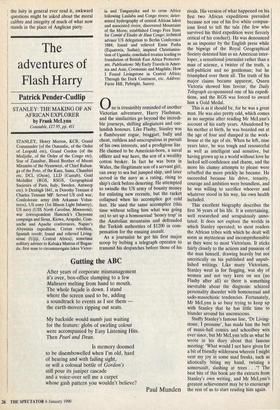The adventures of Flash Harry
Patrick Pender-Cudlip
STANLEY: THE MAKING OF AN AFRICAN EXPLORER by Frank McLynn
Constable, £17.95, pp. 411
STANLEY, Henry Morton, KCB, Grand Commander (of the Osmanlie, of the Order of Leopold etc), Grand Cordon (of the Medjidie, of the Order of the Congo etc), Star of Zanzibar, Blood Brother of Mtemi Mirambo of the Nyamwezi, of Chief Rubun- ga of the Poto, of the Kusu, Sama, Chumbiri etc, DCL (Oxon), LLD (Cantab), Gold Medallist (RGS, RSGS, Geographical Societies of Paris, Italy, Sweden, Antwerp etc). b Denbigh 1841, m Dorothy Tennant d Charles Tennant MP. Served US civil war, Confederate army (6th Arkansas Volun- teers), US army (1st Illinois Light Infantry), US navy (USS North Carolina, Minnesota); war correspondent Hancock's Cheyenne campaign and Sioux, Kiowa, Arapaho, Com- anche and Apache conferences, Napier's Abyssinia expedition, Cretan rebellion, Spanish revolt; found and relieved Living- stone (Ujiji, Central Africa); sometime military adviser to Kabaka Mutesa of Bugan- da; first man to circumnavigate lakes Victor- ia and Tanganyika and to cross Africa following Lualaba and Congo rivers; deter- mined hydrography of central African lakes and associated rivers; discovered Mountains of the Moon; established Congo Free State for Comite d'Etudes de Haut Congo; technical adviser US delegation to Berlin Conference 1884; found and relieved Emin Pasha (Equatoria, Sudan); inspired Christianisa- tion of Uganda; concluded treaties leading to foundation of British East Africa Protector- ate. Publications: My Early Travels in Amer- ica and Asia; Coomassie and Magdala; How I Found Livingstone in Central Africa; Through the Dark Continent, etc. Address: Furze Hill, Pirbright, Surrey.
ne is irresistibly reminded of another Victorian adventurer, Harry Flashman, and the similarities go beyond the incredi- ble journeys, shifting allegiances and out- landish honours. Like Flashy, Stanley was a flamboyant rogue, braggart, bully and cheat, ruthless and unscrupulous in pursuit of his own interests, and a prodigious liar. He claimed to be American-born, a naval officer and war hero, the son of a wealthy cotton broker. In fact he was born in Wales, the illegitimate son of a servant girl, ran away to sea but jumped ship, and later served in the navy as a rating, rising to ship's clerk before deserting. He attempted to swindle the US army of bounty money for enlisting new recruits, but the racket collapsed when his accomplice got cold feet. He used the same accomplice (this time without telling him what was going on) to set up a homosexual 'honey trap' in the Anatolian mountains and defrauded the Turkish authorities of $1200 in com- pensation for the ensuing assault. As a journalist he got his first major scoop by bribing a telegraph operator to transmit his despatches before those of his
0
rivals. His version of what happened on his first two African expeditions prevailed because not one of his five white compan- ions lived to tell the tale (the few who survived his third expedition were fiercely critical of his conduct). He was denounced as an imposter by the English press while the bigwigs of the Royal Geographical Society detested him as an American inter- loper, a sensational journalist rather than a man of science, a twister of the truth, a self-publicist and no gentleman; but he triumphed over them all. The truth of his major claims became apparent, Queen Victoria showed him favour, the Daily Telegraph co-sponsored one of his expedi- tions, and the RGS was forced to award him a Gold Medal.
This is as it should be, for he was a great man. He was also pretty odd, which comes as no surprise after reading Mr McLynn's account of his early years. Abandoned by his mother at birth, he was boarded out at the age of four and dumped in the work- house at the age of six. When he left, nine years later, he was tough and resourceful as well as intelligent and sensitive, but having grown up in a world without love he lacked self-confidence and charm, and the more his clumsy attempts to please were rebuffed the more prickly he became. He succeeded because his drive, tenacity, courage and ambition were boundless, and he was willing to sacrifice whoever and whatever stood in his way, his own health included.
This excellent biography describes the first 36 years of his life. It is entertaining, well researched and scrupulously anno- tated. It does not explore the worlds in which Stanley operated; to most readers the African tribes with which he dealt will seem as mysterious and incomprehensible as they were to most Victorians. It sticks fairly closely to the actions and passions of the man himself, drawing heavily but not uncritically on his published and unpub- lished writings. Like many Victorians, Stanley went in for flogging, was shy of women and not very keen on sex (no Flashy after all) so there is something inevitable about the diagnosis: schizoid personality disorder with homosexual and sado-masochistic tendencies. Fortunately, Mr McLynn is so busy trying to keep up with Stanley that he has little time to blunder around his unconscious.
Stuffy Stanley's famous line, 'Dr Living- stone, I presume', has made him the butt of music-hall comics and schoolboy wits ever since, but Mr McLynn tells us what he wrote in his diary about that famous meeting: 'What would I not have given for a bit of friendly wilderness wherein I might vent my joy in some mad freaks, such as idiotically biting my hand, twisting a somersault, slashing at trees . . .'? The best bits of this book are the extracts from Stanley's own writing, and Mr McLynn's greatest achievement may be to encourage the rest of us to start reading him again.










































 Previous page
Previous page